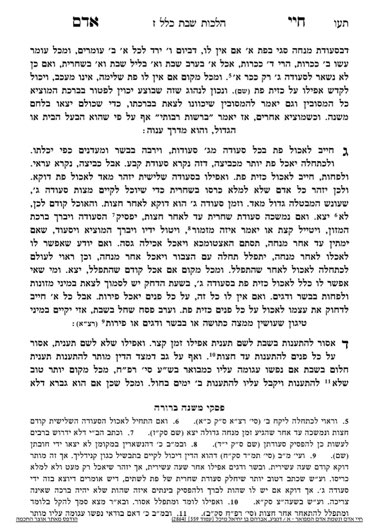The current series, which will cover seudos Shabbos and fasting on Shabbos, is available for sponsorship. Please contact Rabbi Reingold for more information.
We have finished siman 4, and have a few more points to discuss regarding a taanis chalom. The Shulchan Aruch, in siman 288:5, writes that some hold one can only fast on Shabbos for a taanis chalom if it is their third time having the dream. Furthermore, some hold that taanis chalom no longer applies, since we no longer know whether a dream is a good or bad sign. Other than the cases explicitly stated in the Gemara as being bad signs, we cannot know what is a good sign or bad sign, and the fact a person is nervous is not reason to allow them to fast on Shabbos.
The Beis Yosef writes a mesorah that there are three dreams for which a person fasts on Shabbos: seeing a sefer torah or tefillin being burned, seeing Yom Kippur during Neila, or seeing the beams of one’s house falling down or one’s teeth falling out. The Shulchan Aruch adds a few others, and writes that the types of dreams mentioned at the end of Gemara Brachos are included as well. Otherwise, even if a person is uncomfortable, they should not fast.
Generally, we do not recommend people fast even in the permissible circumstances mentioned above.
The Be’er Heiteiv brings an interesting opinion from the sefer Korban Mincha. He writes that if he saw Yom Kippur in a dream, he would make a seudah, because he took it as a sign that he was given kapparah. Thus, we see that even a dream which seems to be bad can be interpreted in ways which are good.
If a person has a dream which seems bad, he should not talk about it, but should speak to someone to whom they are close and who can put a positive spin on it. Chazal tell us that dreams follow after the one who verbally interprets them, so when a person puts a positive spin on it, it is effective in mitigating the impact of the dream.
If a person sleeps on Shabbos afternoon and has a bad dream, the Shulchan Aruch brings a few opinions. One opinion is that they should fast 12 hours from that point. Another opinion is that they should fast until the night. Another opinion is that they should fast until the night but then fast again during the week as a kapparah for fasting on Shabbos.
Moving on from taanis chalom, the Chayei Adam discusses the idea of davening for a bakasha or tzarah on Shabbos. The Shulchan Aruch writes that generally, we do not daven for things on Shabbos unless there is an immediate tzarah. Either way, the Shulchan Aruch cautions against fasting as a response to the tzarah.
Summary
- The Beis Yosef brings a mesorah as to specific bad dreams for which one can fast on Shabbos, but otherwise, we generally refrain from fasting on Shabbos.
- If a person has a dream which seems bad, they should speak to someone to whom they are close and who can put a positive spin on it, as a dream follows its verbal interpretation.
- Generally, we do not daven for things on Shabbos unless there is an immediate tzarah.



